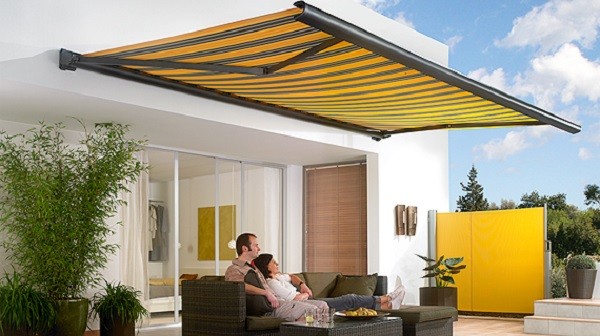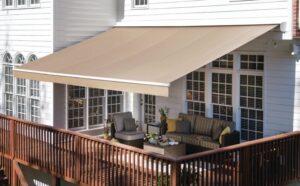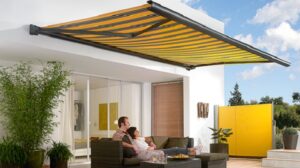The exterior of the house could always use some tweaks with several decorative accessories. It is imperative to decorate your home exteriors, specifically the entrance doors, the windows, and the patio area. A latest Awning design can enhance all these spaces. An awning or an overhang is usually a second covering to the exterior wall of a building. It is traditionally composed of a woven canvas of acrylic, cotton, or polyester yarn that stretches tightly over some planar frames. This can also be considered as a window and door treatment for the house’s exterior that dramatically affects the architecture.
The awning location is generally above the window or a door of the house and can also be placed with columns typically perfect for patio design. Awnings come in different varieties, namely; propulsive awning, which can be manually opened and closed; retractable awnings are commonly used in patios and an aluminium awning which is more enduring. This overhang decor aids in keeping the sun or rain out; more importantly is sturdy decor for an entrance of a building. Also, awnings affixed to the interior can alternatively be used as a window treatment.
Different Types of Awning Designs
Retractable Awning
The retractable awning can stretch further to provide shelter or retract so that you can enjoy the sun. Not only do they offer outdoor shelter options, but you also shield your awning when not using it.
Fixed Awning (Wall-Mounted)
The fixed awning is wall-mounted and provides permanent shelter. It often, but not always, has extra support poles at the end of the extension for outstanding durability.
Portable (Freestanding)
There are numerous portable or freestanding awning options to choose from. The three main types are:
-
Umbrella
-
Freestanding awning
-
Canopy
Home Office and Study Design Ideas
HOW TO PICK THE BEST AWNING DESIGN FOR YOUR HOME
Awnings can drastically elevate your outdoor spaces, making them comfortable and pleasant all year round. By providing covering, outdoor entertaining or dining spaces like patios and decks become useful no matter the weather in your area.
Whether you’re entertaining your friends during the summer and need your guests to be shielded from harsh UV rays or want to savor a cup of coffee on a rainy morning without getting soaked, awnings will have you covered.
Business-owners, especially those running cafes and restaurants, can also profit hugely from installing awnings to their business. Awnings also shield your window frames and outdoor furniture while still enabling you to relish the view from indoors, unlike blinds.
So, if you’ve selected that you need to install awnings to your home, how do you go about picking on the best awnings for you? Here are some tips we recommend considering before choosing awnings:
MATERIAL
Various materials require different amounts of maintenance and satisfy the look of specific homes over others.
The two most popular materials used for awnings are outdoor fabric and aluminum:
- Outdoor fabrics come in a spectrum of colours but demand extra maintenance than aluminum blinds.
- Aluminum blinds are strong but generally don’t support customization when it comes to design and colours.
ANGLE
The angle of an awning is easily overlooked by some people but is crucial for its overall appearance.
For windows facing east or west, the measurement of the drop (angle) is recommended to be 65-75%. For a south-facing window, the angle can be as low as 45-60% as less coverage is required due to the sun’s direction.
SIDE PANELS
Some people may also require the added feature of side panels, which changes the awnings’ architectural feel and look. These panels are also good for providing coverage from a different direction if you require extra shade.
COLOR
The fundamental rule of choosing the right colour for your awning is to think of what complements your home or business’s overall architecture.
Generally, lighter colours are favoured as they block and reflect sunlight and heat. By opting for complementary styles and colours, you can design a beautiful sense of flow between your indoor and outdoor spaces.
STYLE
A variety of awning styles is available to choose from to match your home or business’s overall look. Some popular types include traditional with closed or open sides, dome style, double bar standard, waterfall, quarter barrel, gable walkway, and semi-circular entrance. You can also speak to an architect or a shade and blinds company to determine your home’s best style or business design.
SIZE
The size of your awnings depends on their purpose and the overall scope of your space. A small awning looks beautiful as a decorative piece, while an oversized awning provides unique coverage and shade to your outdoor space.
STATIONARY, RETRACTABLE OR FREESTANDING AWNINGS
The type of awning is also a critical point to contemplate.
Roll-up or retractable awnings enable you to adjust the awnings, meaning you can gain the best natural sunlight during winters if you want.
Retractable awnings are therefore especially suitable for patios or decks, providing you to adjust them when not in use. With the help of motors and switches, retracting the awning becomes a breeze.Significantly advanced models have automated sun and wind sensors, where you don’t need to tinker with them every time the weather shifts.
However, remember that retractable awnings are normally not designed to withstand massive rains, high winds, or snow. If bad weather hits, retract your awnings so they are not destroyed.
Freestanding awnings are also generally used for patios, decks, or terraces. They efficiently segment a space, which is excellent if you like to assign a separate area to the BBQ, for example. Businesses also love freestanding awnings, as they can be utilized for advertisement.
Tips for Choosing the Perfect Apartment Plan
Retractable awning fittings and components
There are four main elements to a retractable awning. They are:
Cover
You want a durable fabric or material that works as a cover. Ideally, the covering will grant the following benefits:
- Durability
- Dirt-resistance
- UV protection
- Color retention that creates a long-lasting impression
If you want more shade, contemplate getting an awning with a drop shade.
Frame
The frame carries the awning. Most are built of aluminum or plated steel. Aluminum is lighter and dosen’t corrode, but galvanized steel is more vital.
There are two main types of frames
- Round tubing, which is molded together.
- Square or rectangular tubing that is welded together.
Cassette
The cassette is the covering encompassing the motor and holds the cover when retracted. It’s the part mounted to the wall.
There are three types of cassettes
- Full (closed) cassette: When the awning is retracted, it’s fully protected.
- Semi cassette: Provide some stability to the covering.
- Open cassette: Retracted awning remains displayed.
Motor
When it comes to the motor, you want one that is:
- Enduring
- Peaceful
- Maintenance-free
If using an awning company to render and install your awning, ask about the kind of motor being utilized and whether it’s durable, quiet, or whether it requires any maintenance.
Modern Home Plans And Design Tips
Awning Design Materials Available
Primary awning materials include:
- Polyester (Vinyl-coated): Polyester is ideal for bigger awnings because it offers “rebound” behaviour to counter sagging in the long term. The vinyl-coated option is immune to UV light, mildew and water.
- Solution-dyed acrylic (Canvas): Best for everyday use because the colours remain vibrant for a long time.
- Metal (aluminum): While durable and comparatively low maintenance, metal awnings can rust and/or dent in a long time.
- Acrylic-coated polyester
Typical Awning Sizes to Get
Unless you get an awning from a retailer that offers various sizes, your awning can be of any size. In other words, it can be a custom fit for the amount of coverage you seek. This is a massive advantage of hiring an awning company to design and install your awning.
Additional Features of Awning Design to Consider
- App/mobile device controlled: If you have a smartphone or tablet, you can now get motorized awnings controlled via a mobile app.
- Light integrated: Don’t forget to check out the option of integrated lighting in your awning.
- Integrated Heating system: You can also get awnings with built-in heaters that project heat to the covered area.
- Skylights: You can also get awnings that have a series of retractable windows that provide plenty of light and air.
What is the Awning Cost?
Retail Price: There is a vast range of awnings available in stores. You can buy different types of awnings from Home Depot, Loses or even Amazon for $400 or more and install them on your own.
Custom Installation: You can also hire an awning company to create a custom-sized awning for you and install it themselves. This is considerably expensive, but it’ll likely be much better quality, adequately sized, and you’ll have all the bells and whistles you need. This will cost you between $1,500 to $5,000+. Many factors go into pricing like material, size and features.
Home Office and Study Design Ideas
How long do awnings last?
It depends on the variety of awning you opt for, your climate, and how often you have it opened. Your awning can easily last five years or 15 years of use. Most quality frames last a long time; it’s the fabric that needs to be restored, so at least when the material needs to be replaced, it won’t cost as much as the full setup.
You can extend your awning fabric’s longevity by retracting it during the winter season and being diligent about its maintenance.


